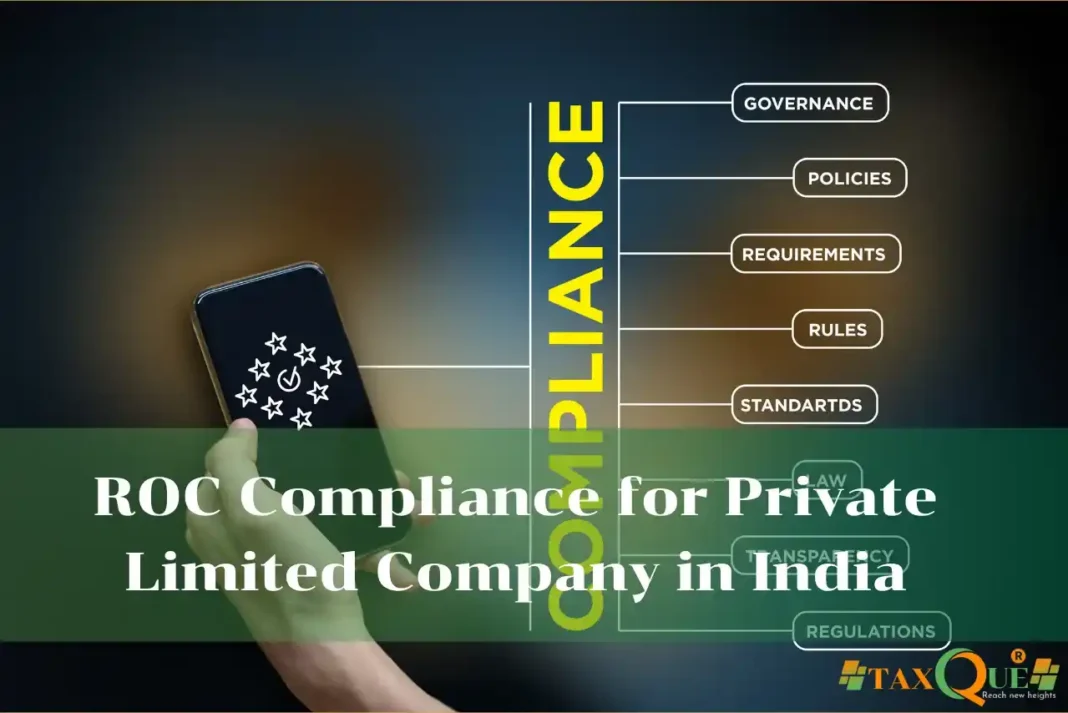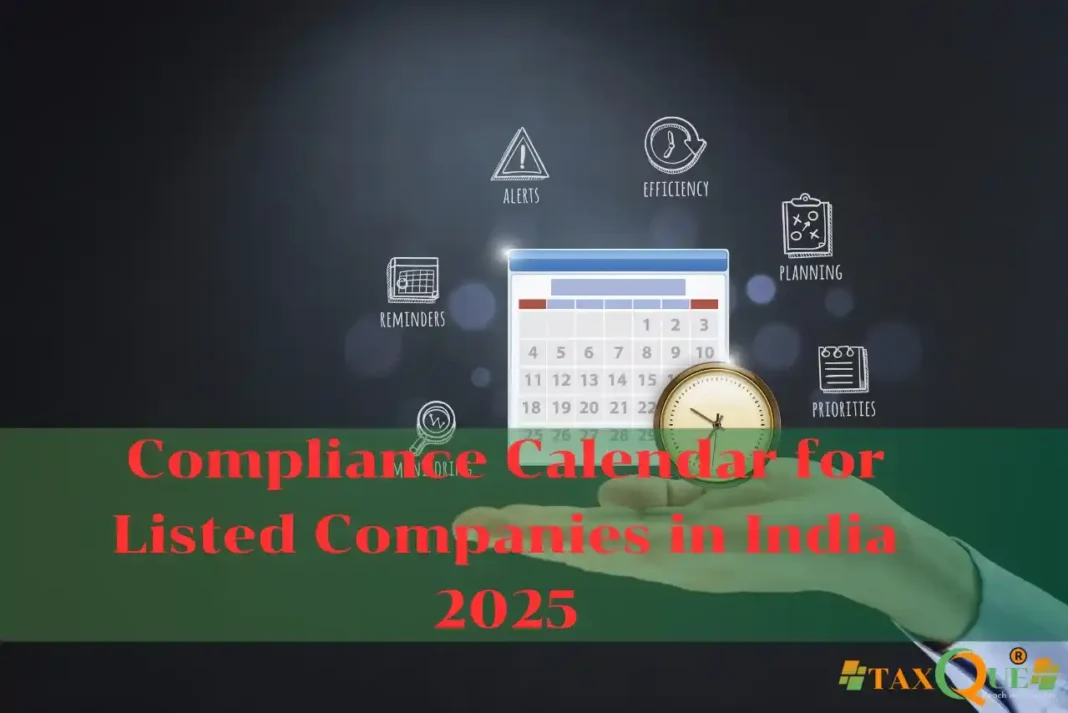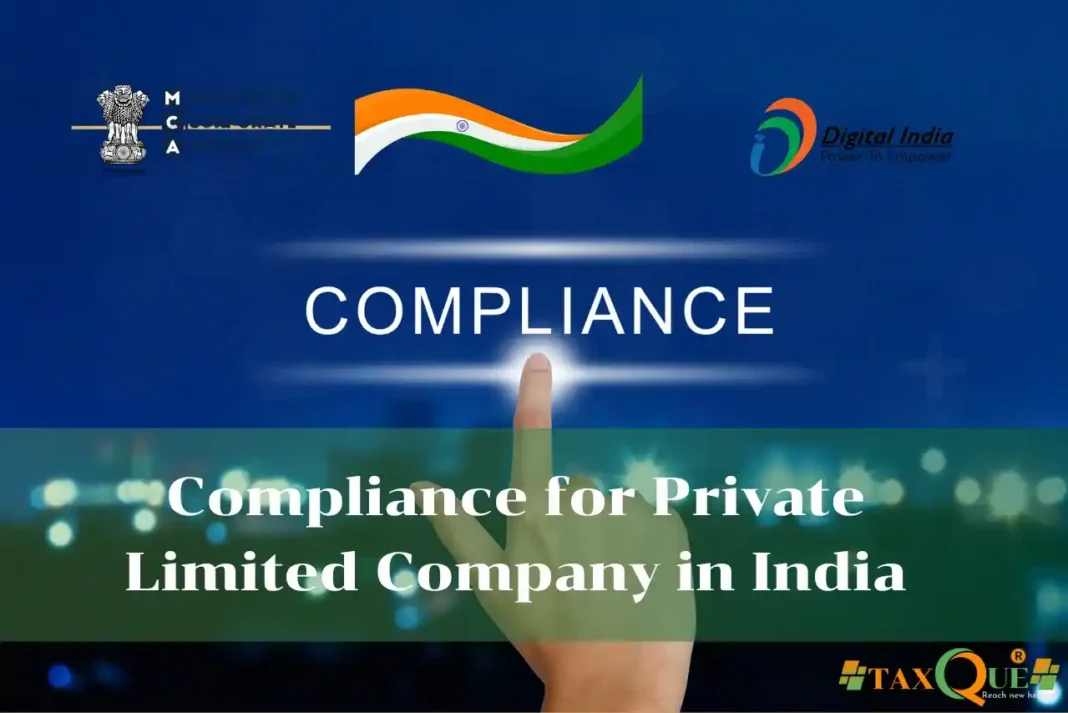Introduction
ROC compliance for private limited company is a critical legal obligation for businesses registered under the Companies Act, 2013, in India. It involves submitting mandatory filings to the Registrar of Companies (ROC) under the Ministry of Corporate Affairs (MCA) to ensure transparency and governance. Non-compliance can lead to hefty fines or director disqualification. This blog offers a detailed guide on ROC compliance for private limited company, covering essential filings, deadlines, and how TaxQue simplifies the process for businesses.
Understanding ROC Compliance for Private Limited Company
ROC compliance for private limited company entails filing annual and event-based forms with the MCA to report financials, governance, and operational changes. These filings keep the company’s records updated and accessible to stakeholders, fostering trust and legal adherence. Proper compliance is non-negotiable for avoiding penalties and maintaining active company status.
1. Key Components of ROC Compliance
To achieve ROC compliance for private limited company, focus on these core areas:
- Annual Filings: Submit financial statements (AOC-4) and annual returns (MGT-7).
- Event-Based Filings: Report changes in directors, share capital, or registered office.
- Statutory Meetings: Conduct board meetings and Annual General Meetings (AGM).
- Record Maintenance: Update statutory registers for directors and shareholders.
2. Major ROC Filings and Deadlines
Here’s a breakdown of ROC compliance for private limited company requirements:
| Filing Type | Requirement | Deadline |
|---|---|---|
| Form AOC-4 (Financials) | File balance sheet and profit & loss statement | Within 30 days of AGM |
| Form MGT-7 (Annual Return) | File shareholder and director details | Within 60 days of AGM |
| Form ADT-1 | Notify auditor appointment/reappointment | Within 15 days of AGM |
| Form DIR-12 | Report changes in directors | Within 30 days of change |
| Form INC-22 | Notify change in registered office | Within 30 days of change |
| Form MGT-14 | File specific board resolutions | Within 30 days of resolution |
- Form AOC-4: File audited financial statements within 30 days of the AGM (by October 30, if AGM is September 30).
- Form MGT-7: Submit annual return with shareholder and director details within 60 days of the AGM (by November 29).
- Form ADT-1: Report auditor appointment within 15 days of the AGM via the MCA portal.
- Event-Based Filings: File DIR-12 (director changes) or INC-22 (office address changes) within 30 days of the event.
3. Steps to Ensure ROC Compliance
Follow these steps to maintain ROC compliance for private limited company:
Step 1: Appoint an Auditor
- Appoint a chartered accountant as a statutory auditor within 30 days of incorporation.
- Conduct an annual audit of financials before the AGM.
Step 2: Conduct Statutory Meetings
- Hold at least 4 board meetings annually, with a maximum gap of 120 days.
- Conduct the AGM by September 30 to approve financials and auditors.
Step 3: Prepare and File ROC Forms
- File Form AOC-4 (financials) within 30 days and MGT-7 (annual return) within 60 days post-AGM.
- Submit Form ADT-1 and event-based forms (e.g., DIR-12, INC-22) as required.
Step 4: Maintain Statutory Records
- Update registers for directors, members, and charges.
- Keep detailed minutes of board meetings and AGM.
Step 5: Track Deadlines with Tools
- Use compliance calendars to monitor filing due dates.
- Rely on TaxQue for automated reminders and expert filing support.
4. Consequences of Non-Compliance
Failing to meet ROC compliance for private limited company can result in:
- Penalties: ₹100/day per form for late filings (AOC-4, MGT-7), with additional fees for prolonged delays.
- Director Disqualification: Directors may be barred for 5 years if filings are delayed for 3 consecutive years.
- Company Status: Risk of being marked “inactive” or struck off the MCA register.
TaxQue simplifies ROC compliance for private limited company with expert guidance, form preparation, and deadline tracking. Visit TaxQue’s ROC services or business compliance guide for seamless solutions.
FAQs
1. What are the mandatory ROC filings for private limited companies?
Form AOC-4 (financials) and MGT-7 (annual return) are required annually, filed within 30 and 60 days of the AGM, respectively.
2. Is ROC compliance mandatory for dormant private limited companies?
Yes, even dormant companies must ensure ROC compliance for private limited company by filing AOC-4 and MGT-7, though simplified forms may apply.
3. What is the penalty for late ROC filings?
Late filings incur a ₹100/day penalty per form, plus additional fees based on the delay duration.
4. Do small private limited companies need audits for ROC compliance?
Yes, all private limited companies require a statutory audit to file Form AOC-4, regardless of turnover.
5. How does TaxQue help with ROC compliance?
TaxQue provides automated filing tools, deadline reminders, and expert support for ROC obligations. Explore TaxQue’s compliance services.
Conclusion
ROC compliance for private limited company is essential for maintaining legal status and stakeholder trust in India. Timely filings of Forms AOC-4, MGT-7, and event-based forms, along with proper audits and meetings, ensure adherence to the Companies Act, 2013. Platforms like TaxQue make ROC compliance for private limited company effortless with expert tools and support. Stay proactive, meet deadlines, and keep your company compliant.





